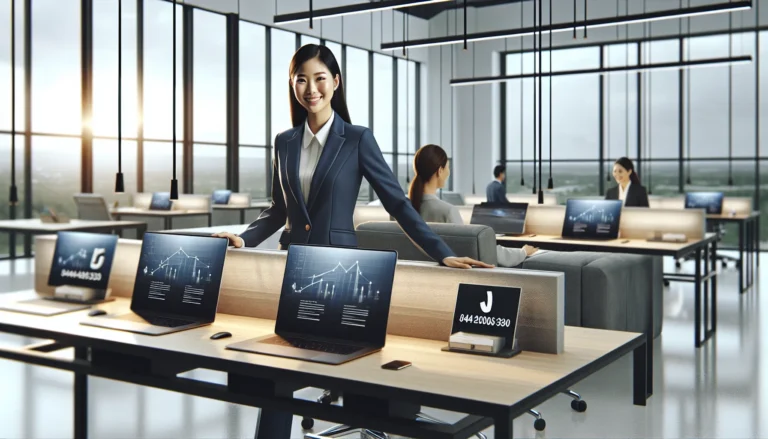Table of Contents
ToggleImagine stepping into a virtual world where your consultation feels as real as a coffee date with your best friend—minus the awkward silences. VR consultation is revolutionizing the way professionals connect with clients, offering a unique blend of convenience and engagement. Whether it’s a healthcare appointment or a business meeting, this cutting-edge technology is transforming the mundane into the extraordinary.
Gone are the days of boring video calls and endless waiting rooms. With VR, clients can immerse themselves in a dynamic environment that enhances communication and understanding. It’s like having a front-row seat to a show where you’re the star. So, buckle up and get ready to explore how VR consultation is not just a trend but a game-changer in the way we interact—because who wouldn’t want to consult in style?
Overview of VR Consultation
VR consultation offers a unique approach to professional interactions, merging technology with personalized service. This method enhances client engagement through interactive environments. Clients experience consultations as immersive sessions, allowing for deeper connections with professionals.
Traditional methods, such as phone calls or video chats, lack the engaging quality of VR. An immersive environment increases attention and understanding, enabling clients to better grasp complex information. Professionals use avatars and digital tools to create a dynamic setting, enhancing the overall experience.
Consultation fields have seen a significant shift due to VR technology. Healthcare professionals utilize VR for patient assessments, making treatments more effective. In education, instructors employ VR to create interactive learning experiences that encourage student participation. Businesses leverage VR for team meetings, reducing travel time and promoting collaboration among remote teams.
Evidence supports the effectiveness of VR consultation. A study by PwC found that employees in VR training improved their skills four times faster than in traditional settings. High levels of satisfaction reported by clients demonstrate the benefits of a more personalized experience.
As organizations increasingly adopt VR, they’re shaping the future of consultations. This advancement is not just a technological novelty; it fundamentally transforms interactions, making them more enjoyable and productive. Enhanced client experiences lead to increased loyalty, driving business growth in various sectors.
Benefits of VR Consultation

VR consultation offers a range of advantages that enhance the overall experience for both professionals and clients. These benefits result from immersive technology that transforms traditional interactions.
Enhanced Patient Engagement
VR significantly boosts patient engagement during consultations. Immersive environments capture attention, making patients feel more involved in discussions. They interact with three-dimensional models and simulations, leading to a better understanding of their conditions. Increased understanding facilitates informed decision-making. Studies demonstrate that patients feel more comfortable asking questions, deepening their connection with healthcare providers. Higher levels of engagement often correlate with higher patient satisfaction scores, reinforcing the value of VR in medical settings.
Improved Treatment Outcomes
VR consultation contributes to improved treatment outcomes through personalized experiences. This technology enables healthcare professionals to simulate various treatment scenarios, allowing patients to visualize the impact of different approaches. Active participation in treatment planning increases adherence to recommended therapies. Research shows that patients who engage with VR during consultations display a greater understanding of their treatment paths, leading to more effective outcomes. Enhanced clarity regarding procedures and expectations reduces anxiety, further promoting successful recovery. This combination of factors ultimately enhances patient well-being and satisfaction with care received.
Challenges of VR Consultation
VR consultation presents distinct challenges that can impact its effectiveness and adoption. Understanding these challenges helps professionals navigate potential obstacles.
Technology Limitations
Technology limitations hinder the seamless implementation of VR consultation. Not all clients possess access to advanced VR equipment, creating disparities in experiences. Some systems require high-speed internet for optimal performance; without it, lagging or connectivity issues can disrupt sessions. Compatibility across different devices can also pose challenges, as software might not function consistently on various platforms. Ensuring staff training on VR tools further complicates the setup, as professionals must be properly equipped to manage and troubleshoot technology concerns. High costs associated with VR hardware and software licenses can deter smaller organizations from adopting these solutions.
Privacy Concerns
Privacy concerns arise with the use of VR consultation. Sensitive information shared during sessions creates risks if not properly secured. Data breaches or unauthorized access can lead to significant ramifications for clients and professionals alike. Many users may feel uncomfortable engaging in VR environments due to fears surrounding surveillance and data use. Additionally, certain jurisdictions enforce strict regulations on client confidentiality, making compliance challenging in a virtual setting. Addressing these concerns requires organizations to prioritize robust security measures and transparent data handling practices to maintain trust and protect client privacy.
Future of VR Consultation
The future of VR consultation is rife with potential. Innovations in technology are set to enhance user experiences and increase accessibility across various sectors.
Innovations on the Horizon
Companies are developing advanced VR systems that incorporate artificial intelligence and machine learning. Enhanced algorithms can tailor consultations to individual user needs, improving interaction quality. New hardware is being designed to be more affordable, while improvements in software facilitate smoother experiences. Enhanced haptic feedback may provide immersive sensations, making consultations feel even more realistic. Cloud-based VR platforms will likely emerge, promoting accessibility regardless of users’ hardware capabilities. These innovations contribute to a more engaging and effective virtual consultation environment.
Potential for Broader Adoption
As VR technology becomes increasingly accessible, professionals from diverse fields will embrace it for consultations. Businesses will likely invest in VR solutions, recognizing their value in enhancing team collaboration and improving client engagement. Educational institutions may integrate VR into curriculums, providing students with practical learning experiences. Healthcare providers will continue adopting VR to offer more effective patient assessments. Cost reductions in technology and growing familiarity may decrease barriers to entry. This broader adoption paves the way for a future where VR consultations become a standard practice across multiple industries.
VR consultation is reshaping the landscape of professional interactions. By fostering deeper connections and enhancing engagement, it stands out as a powerful alternative to traditional methods. As technology advances and becomes more accessible, the potential for VR to revolutionize fields like healthcare, education, and business is immense.
The benefits of immersive experiences are clear, as they not only improve understanding but also boost client satisfaction. While challenges remain, the ongoing innovations in VR technology promise to overcome these hurdles. The future of consultations is bright, with VR leading the way toward more interactive and personalized experiences that drive success across various sectors.





